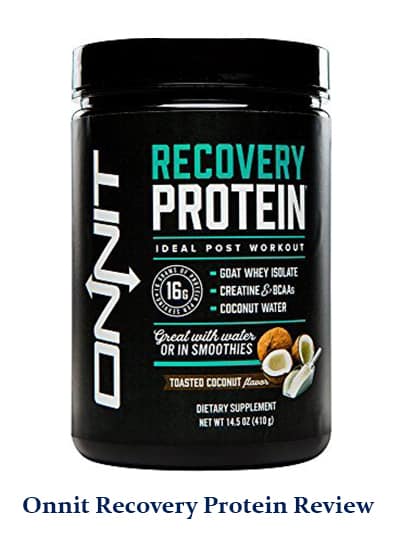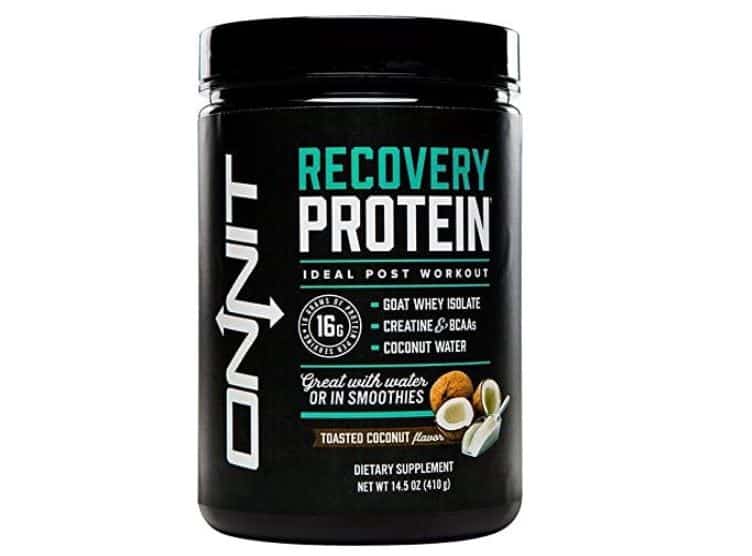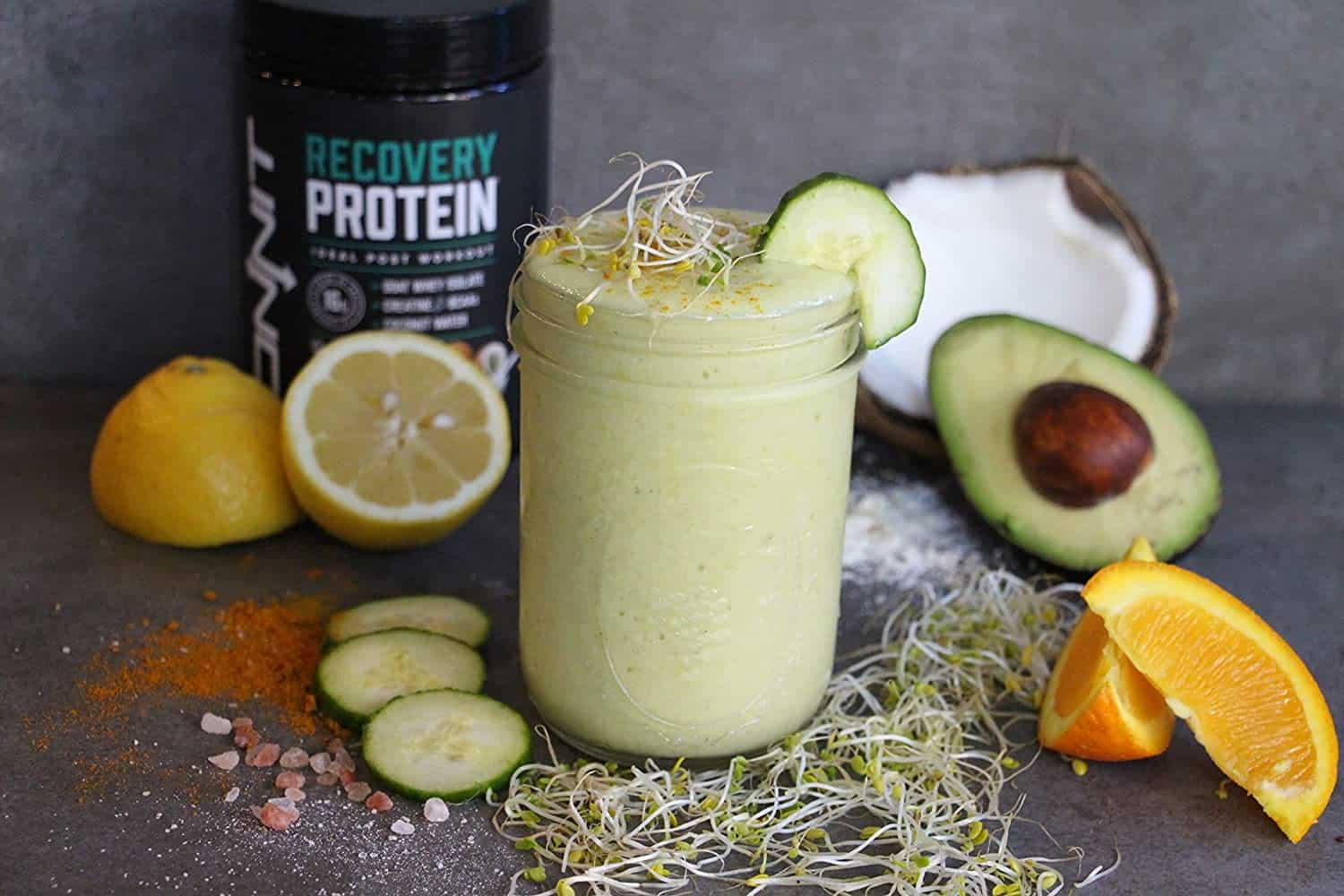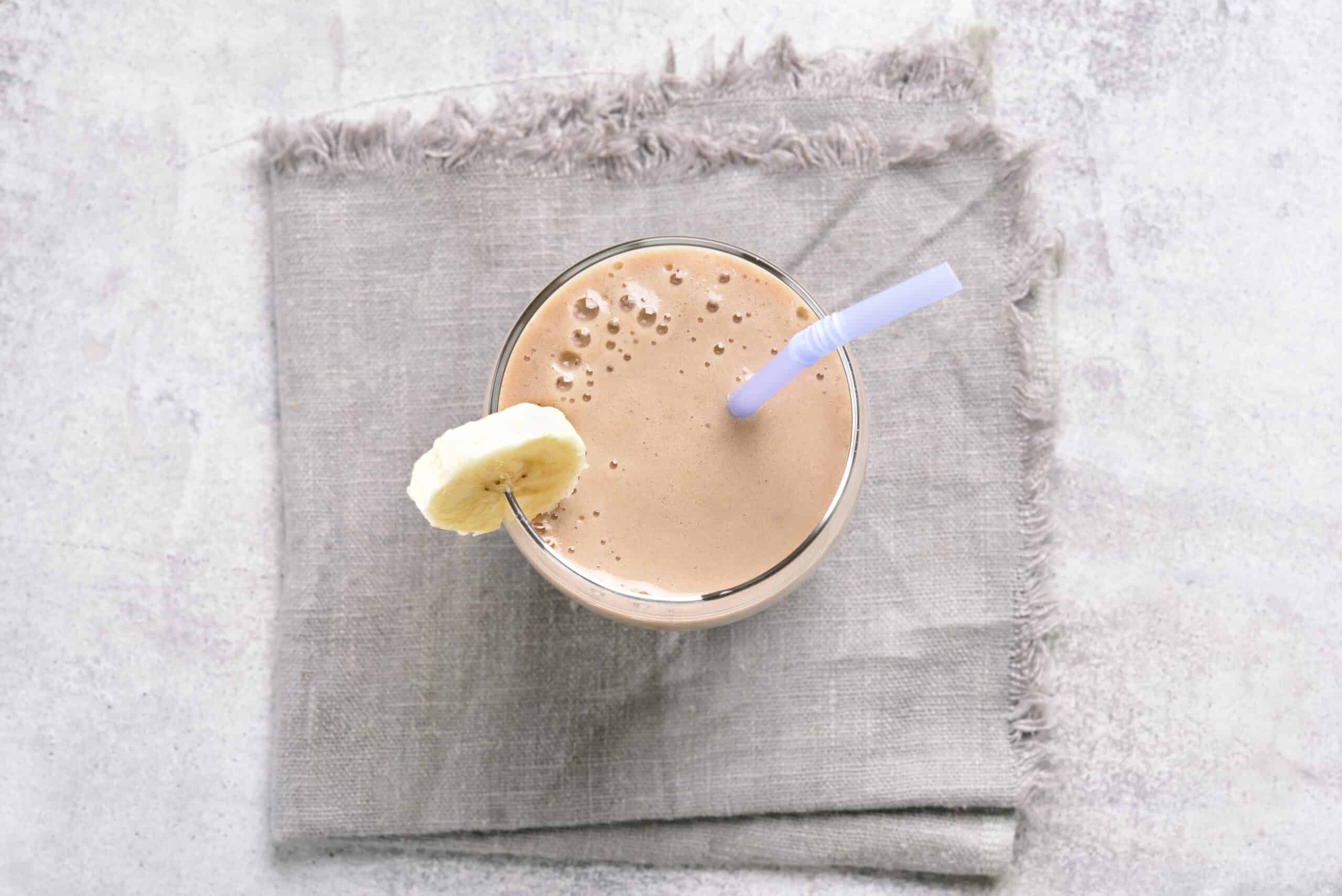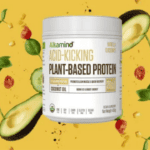Onnit, while a relatively new supplement company, has been quite high profile nowadays. This is thanks to the marketing efforts of one of its founders, popular comedian, podcaster, and MMA commentator, Joe Rogan. Never missing a chance to plug Onnit and its products on his podcast, fans of the highly popular Joe Rogan Experience podcast will no doubt be more than aware of Onnit.
But despite its popularity, the question is, are its products any good? Well, today we will answer that question in relation to one specific Onnit product: Onnit Recovery Protein. We will give you a detailed breakdown of what this product contains, how it can help you, and whether it provides true value for money.
Topic Contents
Onnit Recovery Protein Review
Onnit Recovery Protein is a post-workout protein supplement. Designed to be more than just a generic protein supplement, Onnit has loaded this product with several core ingredients that differentiate it from the crowded protein shake market. Let’s see how they have done so.
Basic Information
Statistics below are presented on a per-serving basis.
| Serving Size | 41g |
| Servings per Container | 10 |
| Calories | 170 calories |
| Protein | 16g |
| Carbohydrates | 14g (1g dietary fiber) |
| Sugars | 4g |
| Fat | 5g (0.5g saturated fat) |
| Sodium | 55mg |
One thing that stands out is that each container only contains a mere 10 servings. The small package size appears to be one-way Onnit is trying to differentiate themselves from the ‘bulk protein powders’ on the market, positioning it as a premium supplement.
The carbohydrate content at 14g is also very high, but this is to be expected from a post-workout supplement. Post-workout supplements do have significant carbohydrate content for replenishing blood glucose levels. The carbohydrate content in this case comes mostly from the coconut water powder.
Protein Sources
Each serving of Onnit Recovery Protein only has 16g of protein, which is on the low end when compared to other protein supplements. Typically, most protein powders contain 20 – 25g of protein per serving. In this case, the protein is provided by a couple of different sources. They are:
Goat Whey Protein Isolate
Each serving of Onnit Recovery Protein contains 10g of goat whey protein isolate, meaning that it makes up 62.5% of the total protein. Here is the reasoning for using goat whey that Onnit posts on its website.
“Goat milk is closer in molecular structure to human milk than cow’s milk, leading many to postulate that it is easier on the body to digest. Goat whey protein has a complete amino acid profile ideal for nourishing tired muscles and is free of any hormones or additives.”
Let’s examine the company’s claims. As you know, regular whey protein is made from cow’s milk, as a byproduct of the cheese manufacturing process. But is whey protein from goat’s milk really easier to digest compared to that from cow’s milk?
The answer looks like it’s an affirmative. The main digestibility issues with milk and they have to do with its lactose content. After all, about 65% of people are less able to digest lactose after infancy. Lactose is a type of sugar formed from glucose and galactose. So, the lower the sugar contents in the milk or whey, the lower the lactose content.
Well, goat’s milk does indeed have a lower lactose content compared to cow’s milk, though not by much. The percentage of lactose in cow’s milk is estimated to be about 4.7% while the percentage in goat’s milk is about 4.1%. So yes, for those with lactose sensitivity, goat whey protein is indeed a better choice compared to cow whey protein.
Further, the fact that Onnit is using a protein isolate over a concentrate is also a positive. When it comes to whey protein, protein isolates have lower carbohydrate and sugar content compared to concentrates. They are, however, costlier.
Finally, Onnit notes that goat whey protein has a complete amino acid profile. This is true, but it’s no different from cow whey protein, which also contains a complete amino acid profile.
Hemp Seed
The second protein source used in Onnit Recovery Protein is hemp protein, at 10g per serving. While hemp protein does contain some protein, at about 30 – 50%, it is also rich in Omega-3 and Omega-6 fatty acids. These fatty acids make up about 10% of the seed.
Hemp protein is also not classified as having a complete amino acid profile. While it does have all the essential amino acids, some are present in too low quantities to be beneficial. The main amino acids lacking in hemp protein are lysine, leucine, and l-trytophan. The lack of leucine is particularly limiting, considering that leucine is considered to be the main muscle-building amino acid.
In terms of digestibility, hemp protein scores fairly well, although significantly below that of whey or casein. As a caveat, hemp protein is an acquired taste and is not too many people’s liking.
Bovine Colostrum
Each serving of Onnit Recovery Protein contains 5g of bovine colostrum. Colostrum is the pre-milk fluid that all mammals which have recently given birth produce. Because newborn mammals have weak digestive and immune systems, colostrum contains enzymes, antibodies, and other growth factors to support the newborn. Because of this, colostrum has gained popularity as a nutritional supplement, often derived from cattle.
However, just because colostrum is beneficial for newborns, the same may not apply to adults. This is because newborns have an undeveloped intestinal tract that allows the growth factors in the colostrum to pass through the intestinal wall and absorbed. In adults, the intestines will break down such beneficial compounds before absorption.
As such, most studies have shown little difference between colostrum supplementation and whey protein supplementation. Because colostrum contains protein, it essentially becomes a mere protein supplement for the most part.
Nevertheless, colostrum supplementation in adults may still have some additional beneficial effects, mostly relating to the immune system. This study showed that bovine colostrum supplementation supports immune function while another noted that it lowered the risk of upper respiratory tract infections.
Protein Sources Conclusion
Overall, Onnit Recovery Protein uses good protein sources and should be more digestible than regular whey protein while providing a complete amino acid profile. The addition of hemp protein, an incomplete protein, appears to be mostly for the beneficial fatty acids.
This explains Onnit Recovery Protein’s rather high-fat content at 5g per serving. Of course, the addition of hemp protein may also just have been to appeal to the ‘hemp’ crowd and to justify charging a higher price.
The relatively unique addition of bovine colostrum may have some positive immune system effects, but other than that, it is no different from regular whey protein. Nonetheless, there are no negatives to adding it into the mix.
Other Beneficial Ingredients
As we said, Onnit Recovery Protein is trying to be more (and charge more) than your average protein powder. To that end, they’ve also added the following ingredients into the mix.
Branch Chained Amino Acids (“BCAAs”)
BCAAs refer to the three essential amino acids, leucine, isoleucine, and valine. The benefits of BCAA supplementation are well-researched. They can fight fatigue and reduce muscle soreness; essentially you last longer during exercise and recover faster after. Onnit Recovery Protein contains 3.5g of BCAAs per serving in a 2:1:1 ratio (the standard BCAA ratio).
However, many ‘regular’ whey protein supplements already contain BCAAs. Further, the 3.5g of BCAAs, while significant, is not really that large an amount. To give you a comparison, that’s about half the amount of BCAAs contained in a serving of the popular Scivation Xtend BCAA supplement. Other well-known whey protein supplements also contain comparable or higher amounts of BCAAs per serving.
Creatine Monohydrate
If there ever was a supplement that virtually everybody, including ‘supplement skeptics’ agree works, it would be creatine. Creatine works by increasing the amount of ATP in your muscles. Think of ATP like the battery of your muscles. Taking creatine is scientifically proven to increase your power output. If you do strength training or like to sprint, you should be taking creatine.
Keep in mind however that creatine will also increase water retention, so you will likely gain some water weight when supplementing with creatine. Also, creatine monohydrate is one of the cheapest supplements out there so the addition of creatine into anything should not be a reason to justify a large added premium.
In terms of dosage, the standard recommended dosage for creatine supplementation is 5g per day. Onnit Recovery Protein contains only 1g of creatine per serving; far too low for effective supplementation.
Coconut Water Powder
Each serving of Onnit Recovery Protein contains 10g of coconut water powder. Coconut water has seen a lot of hype surrounding its use in recent years, with many companies touting its amazing hydration benefits. But very little research has been done regarding coconut water’s hydration capabilities, and what research has been conducted has shown mixed results.
For instance, this study showed that coconut water performed better than water in post-exercise hydration. The study concluded that coconut water was just as good as a commercial sports drink, but with better fluid tolerance. On the other hand, these two studies found little difference in the post-exercise
rehydration index.
Nonetheless, even the studies that showed no significant difference remarked that because of the natural sweetness of coconut water, athletes found it easier to consume and tolerate larger amounts compared to water or sports drinks. The studies noted that coconut water caused less nausea, fullness, and no
stomach upset.
Hence, the addition of coconut water powder into Onnit Recovery Protein will likely have some benefit. If you had a very strenuous workout, the addition of coconut water powder might make Onnit Recovery Protein easier and more palatable to consume.
Flavor and Mixing
Onnit Recovery Protein only comes in one flavor – Toasted Coconut. Perhaps the presence of coconut water powder made this the only palatable flavor, but this is only speculation. The general consensus on the flavor is average to below average. As we mentioned, hemp generally doesn’t have the best taste. If you are using this product, we recommend mixing it with some other flavored drink; not water.
Mixing is also not the best. The addition of the hemp seed again leaves the whole mix with a very grainy texture that would be unpleasant if only mixed with water. So basically, if you want to consume this product, make sure you don’t mix it with water.
Price per Serving
One container of Onnit Recovery Protein retails for $39.95 (For the latest prices and discounts, check here) on the official Onnit website. At 10 servings per container, this equates to $4.00 per serving.
Final Verdict
Onnit has developed a reputation for being a premium supplement brand, and Onnit Recovery Protein is no different. Its use of a mixture of goat whey protein isolate, hemp seed, and bovine colostrum all show how the company is trying to differentiate itself from the pack. And there’s nothing wrong with that; as a protein supplement, Onnit Recovery Protein will definitely get the job done.
The question is, are the extra benefits from this product worth its price point? It costs $4.00 per serving; for reference, most other regular whey protein supplements cost under $1.00 per serving. That means that Onnit Recovery Protein is more than quadruple the price of regular whey protein supplements. So does the use of ‘premium ingredients’ justify the price?
In our view, it doesn’t. As we have explained, goat whey protein and bovine colostrum have the little added benefit over regular whey protein. Maybe some easier digestibility and some immune support function, but that’s all. The hemp seed provides extra healthy fats, but that’s nothing you can’t get from a regular Omega fatty acids supplement.
Same goes for the coconut water; yes it might make the protein go down easier after a workout, but again, can it all justify costing more than four times as much? Further, the BCAA and creatine content in this product is also nothing special. Other far cheaper protein supplements have just as much or even more.
In conclusion, Onnit Recovery Protein is a high-quality post-workout protein supplement. It is fully organic, using ingredients such as organic acacia gum, organic rice hull concentrate, stevia, and sunflower lecithin. However, it is also expensive; very expensive.
If budget is not an issue for you, then we can recommend this product without reservation. But for the rest of us, you would likely get almost as much benefit as with a regular whey protein supplement.
Quick Review Table
| Pros | Cons |
| High-quality ingredients | Extremely expensive |
| Organic | Additional benefits do not justify the high price |
| Better digestibility | Only 16g of protein per serving |
| Might support immune system function |
Recommended Reads:
- Special K Protein Shake Review: Is This Any Good?
- How to Find the Best Protein Powder: The Full Alt Protein Guide
Alt Protein Team is a team of professionals and enthusiasts committed to bringing you the most up-to-date information on alternative protein, health and wellness, workouts, and all things health-related. We’ve reviewed a lot of products and services so you don’t have to guess when you spend your hard-earned money on them. Whether you want to shed some pounds, build lean muscle or bulk, we can help you figure out what you need to do and what you need to have to achieve your goals.

